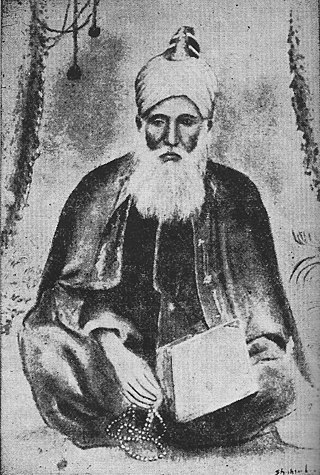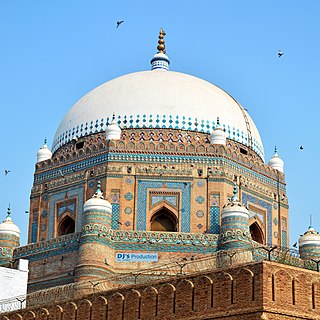Related Research Articles

Sayyid Abdullāh Shāh Qādrī, known popularly as Baba Bulleh Shah and vocatively as Bulleya, was a Punjabi revolutionary philosopher, reformist and Sufi poet, universally regarded as the 'Father of Punjabi Enlightenment'; and one of the greatest poets in the Punjabi language. He criticised powerful religious, political, and social institutions; and is revered as the 'Poet of the People' amongst Punjabis.

Kasur is a city to the south of Lahore, in the Pakistani province of Punjab. The city serves as the headquarters of Kasur District. Kasur is the 16th largest city in Punjab and 24th largest in Pakistan, by population. It is also known for being the burial place of the 17th-century Sufi-poet Bulleh Shah. It is farther west of the border with neighboring India, and bordered to Lahore, Sheikhupura and Okara Districts of Punjab. The city is an aggregation of 26 fortified hamlets overlooking the alluvial valleys of the Beas and Sutlej rivers.

Pir Waris Shah was an 18th-century Punjabi Muslim Sufi poet of the Chishti order, known popularly for his contribution to Punjabi literature.

Sultan Bahu, was a Punjabi Muslim poet, Sufi, scholar, and historian of the 17th century. Renowned for his mystical poetry, he was active during the reigns of Mughal emperors Shah Jahan and Aurangzeb.

Heer Ranjha is a traditional Punjabi folk tragedy with many historic poetic narrations; with the first one penned by Damodar Gulati in 1600s, on the preexisting oral legend; and the most famous one, Heer, written by Waris Shah in 1766, in the form of an epic. Set in Takht Hazara and Tilla Jogian, it follows the story of love, forced separation, and eventual simultaneous demise of two youths in the Punjabi countryside.

Shah Inayat Qadri was a Punjabi Muslim Sufi scholar, saint and philosopher of the Qadri Shattari silsila (lineage). He mostly wrote his philosophical works in Persian. Shah Inayat Qadiri is famous as the spiritual guide of the universal Punjabi poets Bulleh Shah and Waris Shah.

A Punjabi Qissa is a tradition of Punjabi language oral story-telling that emerged in Punjab region of eastern Pakistan and northwestern India, with the fusion of local Punjabi people and migrants from the Arabian peninsula and contemporary Iran.

Mīān Muhammad Bakhsh was a Punjabi Muslim poet from Khari Sharif, Kashmir. He wrote 18 books during his lifetime of 77 years, especially remembered for his romantic epic poem, "Saiful Maluk" in which he wrote the traditional Arabic story of Prince Saiful Maluk into a poem. He also wrote the romantic tragedy, "Mirza Sahiban". Most of his work is in Punjabi, with the exception of the book "Yari", written in Persian.
Punjabi literature, specifically literary works written in the Punjabi language, is characteristic of the historical Punjab of present-day Pakistan and India and the Punjabi diaspora. The Punjabi language is written in several scripts, of which the Shahmukhi and Gurmukhī scripts are the most commonly used in Western Punjab and Eastern Punjab, respectively.

Sayyid Sāhib Ḥusayni was a famous Sufi saint from Hyderabad State, India and had a great influence over spiritual developments in the Deccan area. He belonged to Qadiri Order, and was a great proponent of the concept of Wahdat al-Shuhood.
Heer Ranjha is a 2013 Pakistani romance drama television serial, based on the classical poem of the same name by Waris Shah, that aired on PTV Home. The drama serial was directed by Shahid Zahoor and written by Ahmed Aqeel Ruby. It first aired on 2 February 2013. The serial stars Ahsan Khan, Zaria Butt, Shafqat Cheema, Sohail Sameer, Sadia Faisal, Saba Faisal, Mohsin Gillani, Masood Akhtar and Afzal Khan.

Sufism has played a major role in the history of Punjab. West Punjab, Pakistan is heavily influenced by Sufi Saints and major Sufi Pirs. The partition in 1947 led to the almost complete cleansing of Muslims from East Punjab. The Sufi shrines in the region continue to thrive, particularly among so-called ‘low’ caste Dalits that constitutes more than 30% of its population. After the partition the Dalit community took over the care of Sufi shrines in the East Punjab.

Shaikh Muhammad Sharif Sabir, better known as Sharif Sabir, was a Pakistani-Punjabi scholar, poet, researcher and educationist who is most known for editing a version of Heer Waris Shah published in 1985. It took him over ten years to complete this work.
References
- 1 2 Muhammad Afzal Shahid. "Waris Shah and his Heer (Research Paper)". Academy of the Punjab in North America (APNA) website. Retrieved 15 June 2021.
- ↑ "Policy Research Group - Strategic Insight - A story retold through ages..." policyresearchgroup.com. Archived from the original on 4 March 2016. Retrieved 26 October 2015.
- ↑ Important Personalities from Kasur District (includes Hafiz Ghulam Murtaza) Government of the Punjab website, Retrieved 15 June 2021
- 1 2 "Encyclopaedia of Untouchables Ancient, Medieval and Modern" By Dr. Rajkumar
- ↑ "Geniuses of Kasur" By Ahmad Ali Kasuri Advocate
- ↑ "Heer Ranjha" By Waris Shah
- ↑ Muhammad Afzal Shahid (4 May 2008). "The Beloved (Heer)". Academy of the Punjab in North America (APNA) website. Retrieved 15 June 2021.